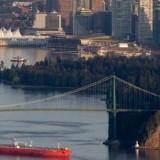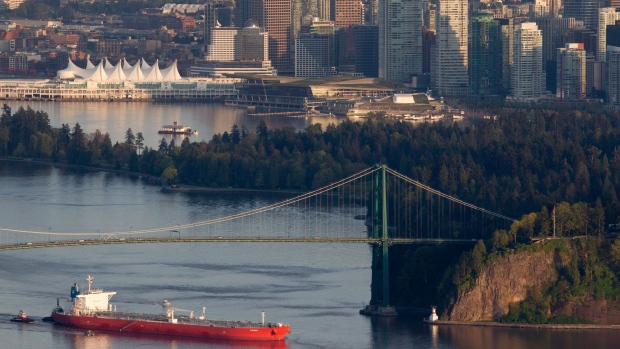On September 30, 2011, a mock trial by judge and jury at the University of Colchester in England found two oil executives of Canada’s tar sands guilty of ecocide. The jury deliberated a mere 50 minutes before reaching its unanimous verdict. During the trial, the evidence supported the contention that development of the tar sands was the biggest crime against nature on the planet, exceeding even BP’s 2010 huge oil spill in the Gulf of Mexico.
The trial, conducted with real judges, lawyers and jury, respected all judicial procedures. It proceeded “as if ecocide were an international crime against peace, alongside genocide, crimes against humanity, war crimes and crimes of aggression, and placed under the jurisdiction of the International Criminal Court” (Toronto Star, March 31/12). The only difference, of course, was that the corporate oil executives were fictitious.
The trial was the creative effort of an international lawyer and environmental activist, Polly Higgins, who has dedicated her life to eradicating ecocide, which is defined as, “The extensive destruction, damage to or loss of ecosystem(s) of a given territory, whether by human agency or by other causes, to such an extent that peaceful enjoyment by the inhabitants of that territory has been severely diminished” (Ibid.).
Polly Higgins’ story is illuminating and inspiring. Until 10 years ago, the Scottish-born lawyer was representing corporations charged with pollution offences. That’s when she had an epiphany, a realization that “the executives and directors of corporations” are legally bound “to maximize profits for their shareholders”, making “it illegal for them to prioritize the environment in their business decisions” (Ibid.).
Higgins’ epiphany changed her perspective and her life. Everything corporations do, she realized, is subservient to their legal obligation to shareholders. Corporations worship at the Altar of Profit in the Temple of Mammon under a set of rules that have evolved over the course of centuries. Their security as legal entities has been entrenched and supported by law to safeguard their historic role in the fabric of an economic system. Environmental protection has never been a consideration, except when beneficial to investors. It is still incidental, a recent and intrusive inconvenience that has only occurred as we have become aware of the terrible ecological consequences of unfettered economic activity.
But a paradigm shift is underway — although some people and governments are more aware of this transition than others. To those who don’t believe the system can be changed, Higgins has two wise and ready replies. The first pertains to slavery, an entire economic system of 200 years ago that was wholly based on the brutal exploitation of others. When the British parliamentarian, Wilbur Wilberforce, spoke for the abolition of slavery, he confronted widespread opposition. The status quo insisted that slavery was “necessary”, the “public” demanded it, and eliminating it would “lead to economic collapse”, Higgins said in an interview with the Toronto Star — precisely the present arguments used against eliminating fossil fuels and giving priority to environmental health. Slavery’s end became inevitable when Charles Grant, the man who owned the British East India Company and controlled over half the world’s slave trade, publicly declared that slavery was morally wrong.
Higgins’ second argument pertains to World War II. In January, 1942, American industry was too busy tearing up railway tracks and building cars, she said, to make the 50,000 planes required for the war effort. “The government came back the next day and said it is now illegal for you to make cars; you will make planes” (Ibid.). So they did. The war was won and industry became more powerful and profitable than ever.
If we can win huge economic benefits by eliminating slavery, Higgins argues, and if we can win a world war by revolutionizing production objectives, then we can rebuild an economic system on a sustainable foundation by respecting environmental imperatives. All that’s needed is the political will.
Environmental concerns are rapidly gaining profile. Indeed, they are quickly moving from issues of interest to issues of worry, emergency and crisis. Unanimous public opinion may still be elusive but the trend is clear. Environmental considerations are gaining precedence over corporate interests. The time is fast approaching when all economic considerations will be founded upon sound ecological principles, simply because to do otherwise will be deemed foolhardy and immoral. Governments that resist this trend will be seen as irresponsible, anachronistic and dangerous. In Higgins’ words, “Now we’re starting to have a narrative emerging in big business which says we have to stop destroying the Earth. We have to put people and planet first. This is about the moral imperative trumping the economic imperative” (Ibid.).
The ground is already destabilizing beneath the old economic model, and a new one is emerging. Its form is still taking shape. Like any profound idea, it is reaching a critical mass and a momentum that will not be stopped by resistance, denial or obstruction. Indeed, efforts to thwart its arrival simply draw attention to its validity and imperative. Those who do not yield to its oncoming weight and authority will soon be judged by history for crimes against nature and humanity. Except this time, the trial of ecocide will be real.




